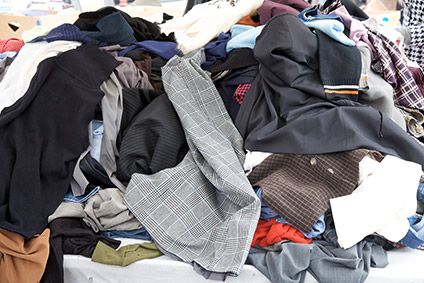
This is nothing new, of course. But just how far have we come, and exactly how much progress is the industry making right now?
Unfortunately, I don’t have the exact answer to either of these questions, but we can certainly see there is an effort there by global fashion brands to lessen their impact. More frequently we’re seeing the launch of partnerships to deal with textile waste – an increasingly troubling problem the industry is desperate to tackle. Last week, H&M joined forces with waste management firm Ramondis to collect, sort and sell used and unwanted garments and textiles.
We’re also seeing a rise in the number of reuse and ‘pre-loved’ services by big fashion brands. There’s also investment in the development of alternative fibres, and textiles made from recycled and sustainable produced materials.
Lenzing and Södra are doing just this with Portuguese fabric manufacturer Riopele, while a team of researchers at Rensselaer Polytechnic Institute in New York were recently awarded a US$745,000 grant to explore sustainable alternatives to the synthetic textiles used in fast fashion.
But while the onus is certainly on those producing clothing to ensure they are doing so in a sustainable way, governments also have a role to play in ensuring the right policies and frameworks are in place to help companies achieve their goals.
A consultation on an Extended Producer Responsibility (EPR) scheme for clothing and textiles was expected from the UK Government’s Department for Environment, Food and Rural Affairs by the end of 2022. This has not happened, and last week the Environmental Audit Committee was told there is unlikely to be one in the near future.
The delays are holding up progress in tackling the growing issue of textile waste. Only last year the Committee warned that in the absence of effective policies to deal with textile waste, over 300,000 tonnes of textiles were being thrown into household black bins every year and sent to landfill or incinerators.
This is a problem that needs to be tackled head on and with all players on the same page. It requires everyone to put their money whether their mouths are if any real impact is to be made.
Lenzing, Södra reach milestone for fashion circularity
H&M, Remondis team on textile waste management initiative
US researchers explore fast fashion textile alternatives
UK Government delays introduction of EPR scheme for textiles
In other news…
Relentless pursuit of better: What’s really disrupting the fashion industry?
How fashion brands can own the resale game, and turn a profit
January UK retail sales up on higher prices but gloomy times loom
Supply chain issues to impact US cotton industry growth in 2023



